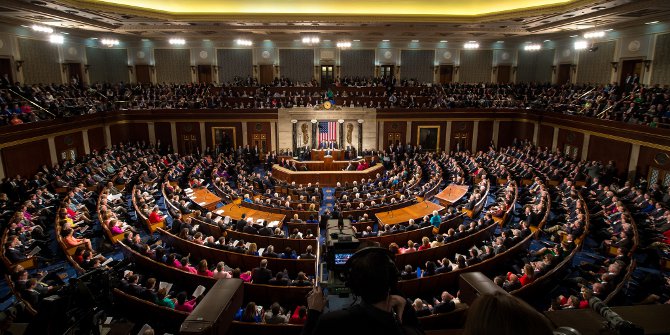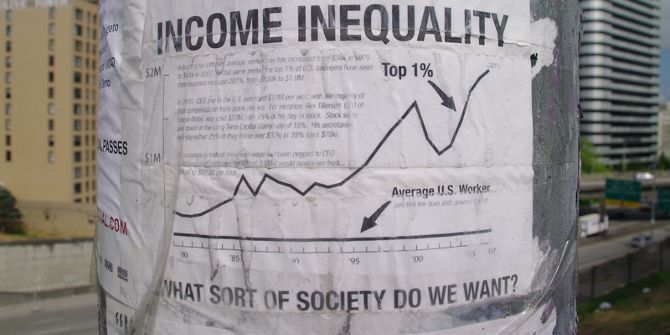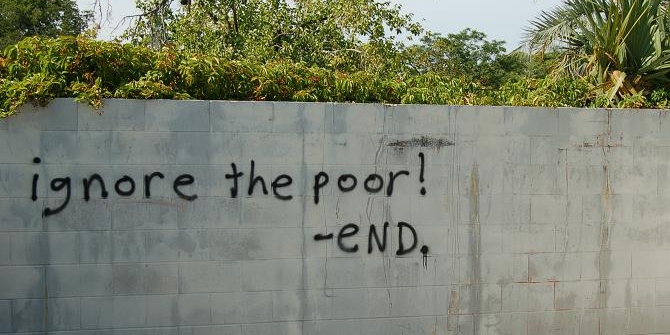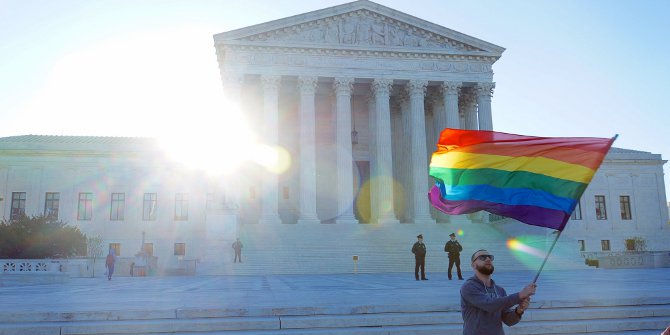 Last week President Obama delivered his 6th State of the Union address, which had a major focus on the growing economic inequality between the wealthiest one percent and the poor and the middle classes. Thomas Hayes writes that while the President’s proposals to address inequality such as tax credits for education and child care and new taxes on high-income earners are unlikely to be taken up the Republican Congress, public opinion is likely to be on Obama’s side. He argues that in light of the growing conversation on inequality, in order to stay electorally relevant ahead of the 2016 presidential election, the Republican Party will have to grapple with policies that it is not traditionally associated with.
Last week President Obama delivered his 6th State of the Union address, which had a major focus on the growing economic inequality between the wealthiest one percent and the poor and the middle classes. Thomas Hayes writes that while the President’s proposals to address inequality such as tax credits for education and child care and new taxes on high-income earners are unlikely to be taken up the Republican Congress, public opinion is likely to be on Obama’s side. He argues that in light of the growing conversation on inequality, in order to stay electorally relevant ahead of the 2016 presidential election, the Republican Party will have to grapple with policies that it is not traditionally associated with.
President Obama’s State of the Union address last week directly addressed growing economic inequality in the United States. Though this was not the first time the President has encouraged Congress to focus on the issue, in the speech on Tuesday, the President laid out perhaps his most ambitious agenda to address growing economic inequality yet. Moreover, the President did not just address income inequality, but also wealth inequality, which is much more pronounced. Many wealthy people may have no income, for example, if all their money is inherited or if much of their gains come from investments. The policies laid out by the President therefore address both ends of the divide, by targeting the top through increased taxes on capital gains, and at the bottom by proposing greater protection for workers.
The President’s speech made reference to specific proposals such as to increase the capital gains tax, strengthen the inheritance tax, enhance tax credits for education and child care, impose new taxes and fees on high-income earners and large financial institutions, make community college free, raise the minimum wage, and provide American workers with paid sick and family leave. Given that the wealth gap is the widest on record in the United States and that the richest 1 percent may control half of the world’s wealth by 2016, the increased attention to the issue comes at an important time. Growing economic inequality, along with climate change, are perhaps the defining features of our time. While the policies the President proposed would still leave the United States behind many wealthy countries that provide much more support to the poor and working classes, they would make a big difference for millions of struggling Americans, and would likely begin to chip away at growing economic disparities.
Many have pointed out, however, that the Republican-controlled Congress is unlikely to take heed, at least in a way preferred by the President (the Republican response has largely been to oppose the new policies). Studies also show members of Congress are much wealthier than the average citizen and do not come from working class backgrounds. Others might be skeptical that citizens in the United States would favor such an ambitious agenda given that Americans are often thought to be more conservative than their European counterparts.
There is reason to believe, however, that the public might be more open to some of the President’s proposals. Despite the economy returning from recession, much of the new economic growth remains concentrated among top earners. Class conflict is real in the United States and studies have found large differences in opinion between those in low and upper income situations. In fact, preferences of the wealthiest Americans are vastly different than those of the majority of Americans. Opinion polls show that where you sit in the economy likely predicts where you stand on a variety of issues. Those who are more financially secure are less likely to believe the government should help the needy, that corporations make too much profit, or that government can function well. A recent study finds that those in the top 1 percent are likely to have a more conservative economic philosophy, and are much less likely to favor government spending in general, and spending to address poverty in particular.

These opinion differences demonstrate that a majority of the American public is supportive of reducing inequality and of the government taking action to reduce differences between the rich and poor. In other words, the public stands closer to the President than to the wealthiest earners, who generally oppose such efforts. Moreover as a fascinating recent study demonstrates, when people are asked to choose a wealth distribution they most prefer, they overwhelmingly do not choose that of the United States, but rather a more equitable distribution—like that of Sweden.
So what does this all mean for the potential success of the agenda laid out by the President? In the short term, the Republican-controlled Congress will likely resist such changes. But so long as the President continues to draw attention to the issue of economic inequality, he may have the ability to set an agenda and shape a debate for the upcoming presidential election of 2016. Doing so puts the Republican Party in a bind as representatives and potential candidates must now discuss policies that are not traditionally seen as a strength for the GOP. This is not to say that Democrats are blameless, as research shows that the party is becoming more business friendly as inequality has increased. Still, since the Reagan era, lower and middle-income families have experienced little or no economic growth under Republican administrations. And many of the policy proposals or governing philosophies associated with “trickle down economics” have failed the poor and working class. While the Republican Party had success in the most recent midterm elections, the conditions for the next election cycle may not be as favorable. Of the 34 Senate races in 2016, 24 will be defended by the Republicans while only 10 will be defended by Democrats. In terms of Electoral College math for the presidency, the GOP might also have an uphill battle, though it is still too early to predict such outcomes. Nonetheless a focus on economic disparities will continue to benefit the Democratic Party so long as the GOP continues to simply oppose policies and offer few solutions.
Putting aside political calculations and party politics, the 2015 State of the Union speech was important in that it may signal a new willingness of elected officials to address the growing economic disparities in the United States. This structural and entrenched inequality will likely only get worse if politicians fail to take action. As the President said toward the end of his speech:
“Imagine if we broke out of these tired old patterns. Imagine if we did something different…That’s a better politics. That’s how we start rebuilding trust. That’s how we move this country forward. That’s what the American people want. That’s what they deserve.”
Breaking the pattern of growing economic inequality is an urgent problem in need of political action. Perhaps this speech and the accompanying proposals will be the start of that change.
Please read our comments policy before commenting.
Note: This article gives the views of the authors, and not the position of USApp– American Politics and Policy, nor of the London School of Economics.
Shortened URL for this post: http://bit.ly/1Jsrswf
_________________________________
 Thomas J. Hayes – University of Connecticut
Thomas J. Hayes – University of Connecticut
Thomas J. Hayes is an Assistant Professor in the Department of Political Science at the University of Connecticut. Professor Hayes specializes in the fields of American politics and political behavior, with an emphasis on economic inequality.






